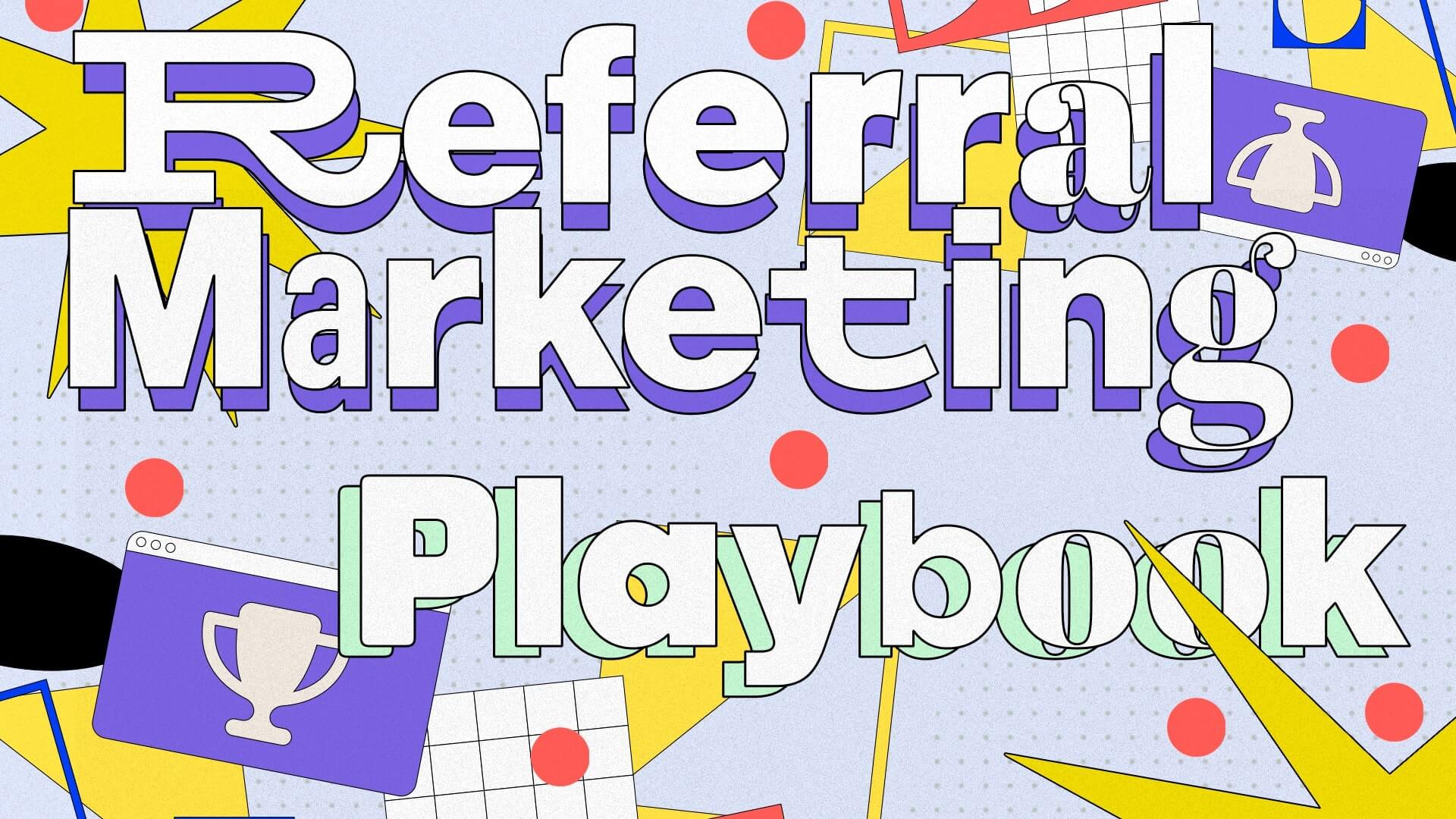Standing out in the bustling world of small business can be challenging. Competition is fierce, and marketing budgets are often tight.
This is where the power of referrals comes into play. Referral marketing is an impactful strategy that leverages satisfied customers to spread the word about your business, turning them into powerful brand advocates.
Building a referral program for small business is a must if you’re looking to maximize growth. It enhances your brand’s visibility and creates genuine connections with potential customers.
In this blog post, we will explore how small business owners like yourself can elevate their businesses by harnessing the full potential of referral marketing.
What Qualifies as a Small Business?
Small businesses are privately owned entities like partnerships, sole proprietorships, or companies with a small number of employees and relatively low revenue. The exact definition varies by industry and country, but generally, they operate on a smaller scale, either local or niche market, often with more direct management and communication.
Small businesses vary widely. Examples include the following:
- local retail stores
- convenience shops or bakeries
- service providers like hairdressers, plumbers, or independent cafes.
These businesses are known for their close relationships with the community and ability to adapt quickly to market changes. They play a vital economic role by creating jobs and fostering local entrepreneurship.

What is Referral Marketing?
Referral marketing goes beyond simply having satisfied customers talk about your brand. It represents a strategic approach to inspiring and rewarding people for sharing positive experiences about your business.
Referral marketing involves structured efforts to engage customers in promoting your brand. It taps into the personal networks of existing customers, leveraging their relationships to expand your reach.
This method relies on intentionality, where businesses actively design programs that reward customers for their referrals.
The main focus is customer acquisition—referral marketing helps businesses, big and small, acquire new customers and strengthens relationships with existing ones by rewarding their loyalty.
Differences from Traditional Word-of-Mouth
While referral marketing is similar to traditional word-of-mouth on many fronts, there is an acute difference between them. Mainly:
Intentional Strategy
While word-of-mouth happens naturally, referral marketing involves deliberate actions to encourage sharing. You create a strategy of encouraging word of mouth and not letting it happen naturally or without any prompting.
Incentive-Based
Referral marketing often includes rewards or incentives, such as discounts or gift cards, for customers who refer others. There are many types of incentives that can be used to encourage customers to promote.
You can learn all about them in our article How To Choose Referral Rewards And Referral Incentives.
Measurable Results
Businesses can track and measure the success of referral programs through specific metrics such as conversion rates, customer acquisition costs, and the lifetime value of referred customers. This ability to quantify results provides valuable insights into the effectiveness of such programs, enabling companies to optimize their strategies and maximize returns.
In contrast, organic word-of-mouth lacks this level of measurability, making it challenging to evaluate its direct impact on growth and sales.
In short, making word of mouth deliberate is the key function of a referral marketing program.
Benefits of Referral Programs for Small Business
Referral marketing works like having your best friend rave about your greatness. This approach can significantly impact small businesses.
But instead of having them tell people about it at random times, we can strategically leverage tools and techniques to amplify the word-of-mouth effect that we are looking for.
Let’s dive into why this strategy works so well:
Higher Quality Leads
When you get a referral, it’s like getting a recommendation from someone you trust—like a friend, family member, or coworker. This means the product already has a stamp of approval before you even check it out.
Because these recommendations come from trusted sources, they’re more likely to lead to customers who stick around and keep buying, boosting both loyalty and long-term value for the business.
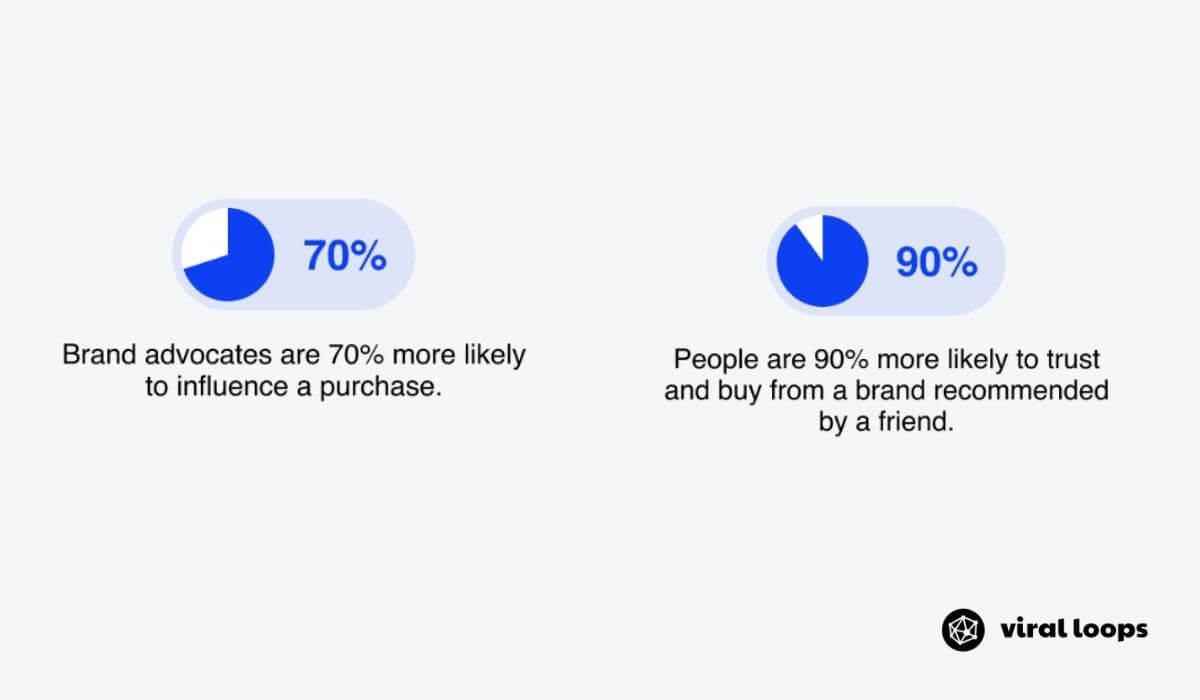
Recommended Reading: 50 Referral Marketing Statistics That Prove Its Power
Increased Brand Awareness and Credibility
Imagine you’re new in school, and a popular kid tells everyone how cool you are. Suddenly, people want to know more about you, right? That’s what referral marketing does for businesses.
When someone you trust recommends a product or service, it feels more genuine than any flashy ad. This personal touch builds credibility and makes potential customers more likely to check out your business.
Cost-effective Acquisition with High Return on Investment (ROI)
Traditional advertising can be super pricey. Think of those big TV ads or billboard costs. In contrast, referral marketing saves money and often gives you more bang for your buck.
Instead of pouring cash into ads, why not reward your customers for spreading the word? This cuts down on expenses and boosts your profits as more people learn about and trust your business.
Sustainable Growth
Like a ripple effect in a pond, one referral can lead to another, creating a chain reaction of new customers discovering your business.
Over time, a successful referral program can significantly contribute to business growth by continuously attracting new customers without causing burnout. The network and reach will expand continuously without hitting a wall—in short, there is hardly ever any end to it.
With each satisfied customer spreading the word, your network grows organically without the need for constant promotional pushes. This natural growth can be more sustainable and less intrusive than other marketing methods.
Referral marketing also develops a cycle where satisfied clients recommend the business to others, receiving an incentive in the process. These referrals, or new clients, then recommend the business to more people in the same way, repeating the cycle, and creating a referral viral loop.
Improved Customer Loyalty and Retention Rates
Have you ever noticed how feeling appreciated makes you want to stay? Referral marketing taps into this by involving existing customers in your success story.
Customers who know their recommendations are valued and contribute to your growth are happier and more likely to stay loyal. It’s a win-win as they continue to advocate for your brand.
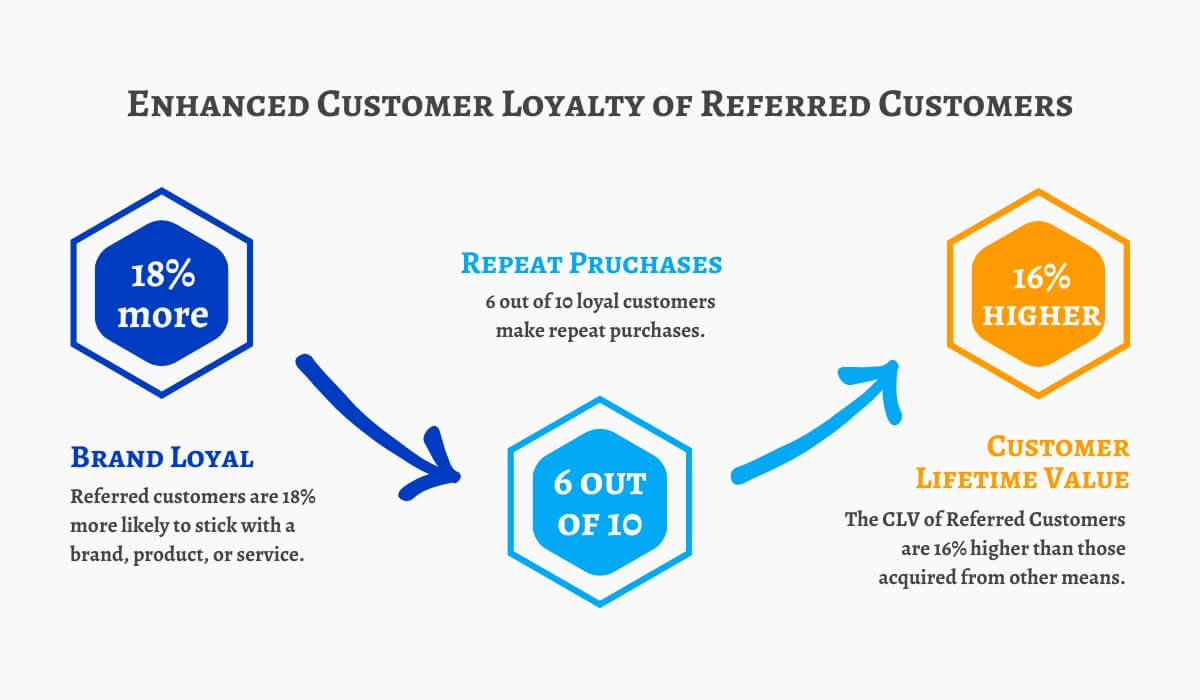
Enhanced Customer Engagement
Engaging with customers isn’t just about sending newsletters or updates. It’s about creating a community where they feel part of something bigger.
Referral programs can encourage customers to interact more with your brand, whether it’s through social media shout-outs or participating in referral campaigns. This increased engagement can lead to stronger relationships and a more enthusiastic customer base.
Access to New Markets
Sometimes, reaching new audiences can feel daunting. But referral marketing can open doors you didn’t even know existed.
When your customers refer your business to friends or family in different areas or circles, it introduces your brand to new potential markets. This can lead to exciting opportunities for expansion and diversification.
Referral marketing is not just a strategy; it’s a powerful tool that leverages human connections. It transforms satisfied customers into brand advocates, fueling growth and strengthening brand loyalty.
Now that we’ve explored the benefits let’s discuss how you can jumpstart your own referral program to take advantage of these.
How to Implement a Referral Program for Small Business
Creating a successful referral program requires a mix of careful planning and strategic execution. Here’s a step-by-step guide to help you get started:
1. Set Clear Goals and Objectives
When setting up a referral program, it’s essential to determine what you want to achieve.
Are you looking to bring in new customers, boost your sales, or make more people aware of your brand? Clearly defining these goals is your first step. Once you know your aim, decide how to measure your success.
Clear goals keep you focused and channel your efforts in the right direction. It’s like setting a destination before a road trip; once you know where you’re headed, you can efficiently map out the best route. This way, your referral program becomes a powerful tool for growth.
2. Identify Your Target Referrers
Identifying your most loyal customers is crucial for an effective referral program. These individuals love your brand and naturally share their positive experiences with others.
Consider factors like the following:
- purchase history
- how often they engage with your brand
- satisfaction scores to pinpoint potential referrers
Focusing on these key customers ensures that referrals are authentic and have a higher chance of converting new prospects into loyal customers.
Identifying your target referrers also gives you a background on their motivations. Understanding their motivations lets you craft personalized incentives, encouraging them to spread the word about your business.
Now that you have identified your target referrers, the next step is to let them choose the right incentives for their efforts.
3. Choose the Right Incentives
Selecting the right incentives that appeal to your target referrers is crucial to boosting your small business through referrals effectively.
Different rewards drive different people, so it’s important to tailor your incentives to suit these preferences. Offering different options such as discounts, exclusive offers, or even monetary incentives can be effective.
Customer referral program ideas for incentives:
- Social Boost: Uses public acknowledgment to motivate sharing and enhance brand reach. This includes giving them a shout-out on your social pages.
- Physical Merchandise: Offers branded items to create a sense of belonging. If the merchandise (such as shirts, caps, umbrellas, etc.) features your business logo, the referrer also becomes a walking advertisement! It’s double the win for you.
- Service or Product Upgrades: Provides enhanced offerings to showcase premium aspects. This includes meal or drink upgrades and the like.
- Promo Codes and Discount Coupons: This provides immediate value through savings. It’s the most recognized, and sometimes the most appreciated, form of referral reward.
- Premium Access & VIP Treatment: Creates exclusive experiences for top referrers. This includes giving them access to premium spots with a view in your restaurant, or special delivery for retail purchases, or VIP treatments in a salon without the extra fees.
- Experiential Rewards: Offers memorable experiences instead of tangible goods, such as trip to attractions or tourist destinations. As this can be more expensive, this should be used with leaderboard-type referral programs where the referrer with the most referrals wins.
- Cash or Cash-Back: This provides straightforward financial rewards for referrals.
The goal is to find what resonates best with your audience. When incentives align with your referrers’ interests, participation in your referral program increases, leading to more successful referrals. This approach encourages more people to talk about your business and helps convert those conversations into actual customer engagement.
4. Leverage Technology for Management
Use software solutions to manage and track referrals efficiently. Tools like referral program software can simplify the process.
These tools help you create your referral program in a jiffy. It also allows you to monitor referrals, manage rewards, and automate communications with referrers with the help of CRM and Mailing Automation integrations.
Efficient referral program management ensures a seamless experience for your business and your customers. One example of an efficient referral software solution is Viral Loops.
What is Viral Loops?
Viral Loops is a referral marketing software that provides everything you need to get started quickly. It’s a simple yet effective way to harness the power of word-of-mouth marketing, helping your business grow.
This strategy taps into the power of word-of-mouth, offering a cost-effective way to grow your small business. Viral Loops makes setting up a referral program tailored to your needs easy, helping you reach more potential customers without spending a fortune on traditional advertising.
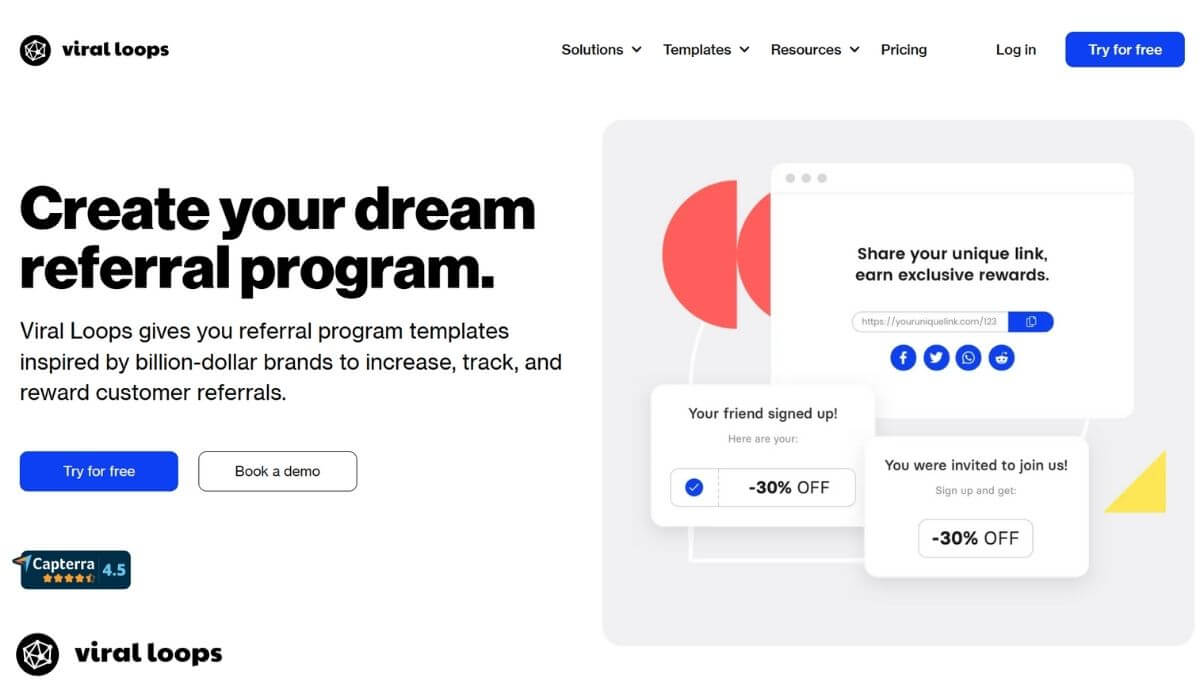
Features of Viral Loops
- Templates: Viral Loops offers different templates for various referral programs, such as refer-a-friend or milestone rewards, inspired by highly successful brands. The easy setup allows small businesses to focus on creative and engaging campaigns without wrestling with complex technology.
- Integrations: Easily integrate Viral Loops with existing tools like email marketing services or CRM systems to streamline operations.
- Real-Time Dashboard: Monitor your campaign’s performance with a dashboard that provides real-time data, allowing for quick adjustments and improvements.
With over 52,000 programs already created, Viral Loops has demonstrated its effectiveness in helping businesses generate leads and boost referrals.
Now that you know what Viral Loops can do, let’s learn more about setting up an actual customer referral program.
How to Develop an Easy Referral Process Using Viral Loops
Creating a referral process using Viral Loops is like setting up a fun game to spread the word about your favorite app or product.
Pick a template that fits your style, like choosing a theme for a party. There are several referral program templates available, including The Milestone Referral, The Startup Prelaunch, The Newsletter Referral, The Tempting Giveaway, The Leaderboard Giveaway, and the classic Refer a Friend. If you use Shopify, we have the Viral Loops for Shopify template.
If none of these fit, there’s the trusty Universal Template, which you can customize based on your needs.
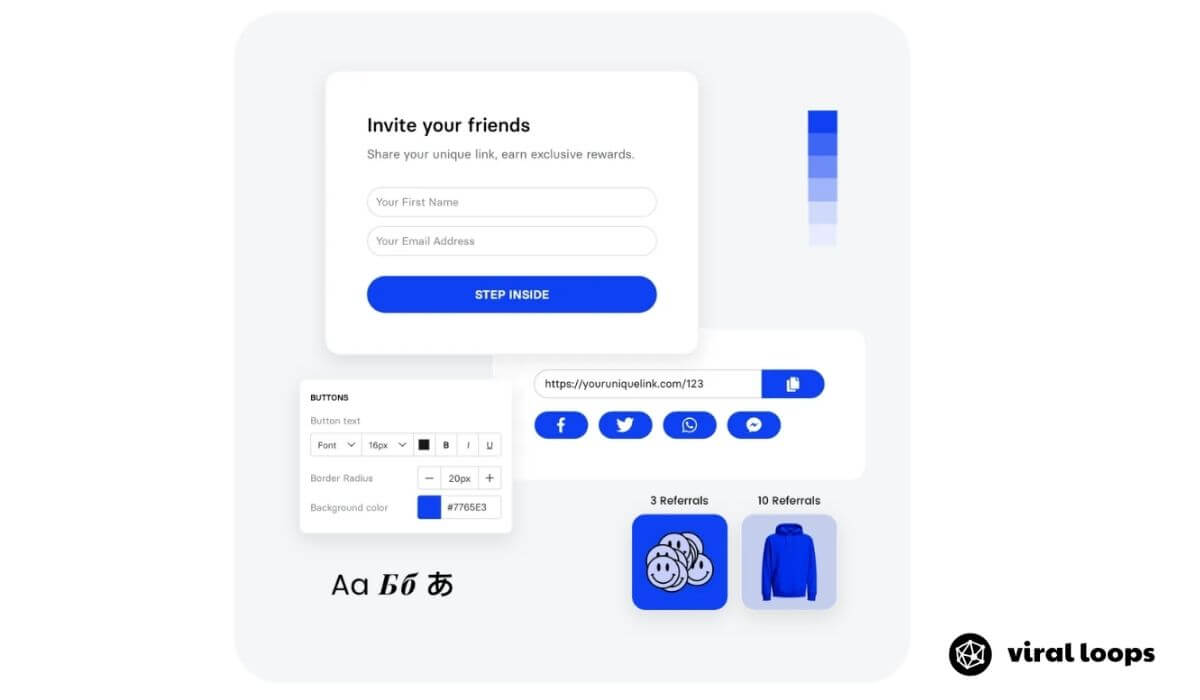
Once your program is ready, you can proceed with promoting it.
5. Promote Your Referral Program
Spread the word about your referral program through various channels. Your referrers won’t know it exists unless you tell them! Also, consistent promotion keeps your program top-of-mind and drives engagement.
Here’s what you can do:
Harness Email Marketing
Design emails about the program and highlight the benefits. Include simple referral links that your customers can easily forward to friends and family. Make sure you craft messages with clear calls to action in your email campaigns, telling them explicitly what you want them to do.
Don’t forget to make it easy for recipients to click and share with their network. The more steps your referrers need to take, the less chance they’ll actually take the next step, so keep it simple!
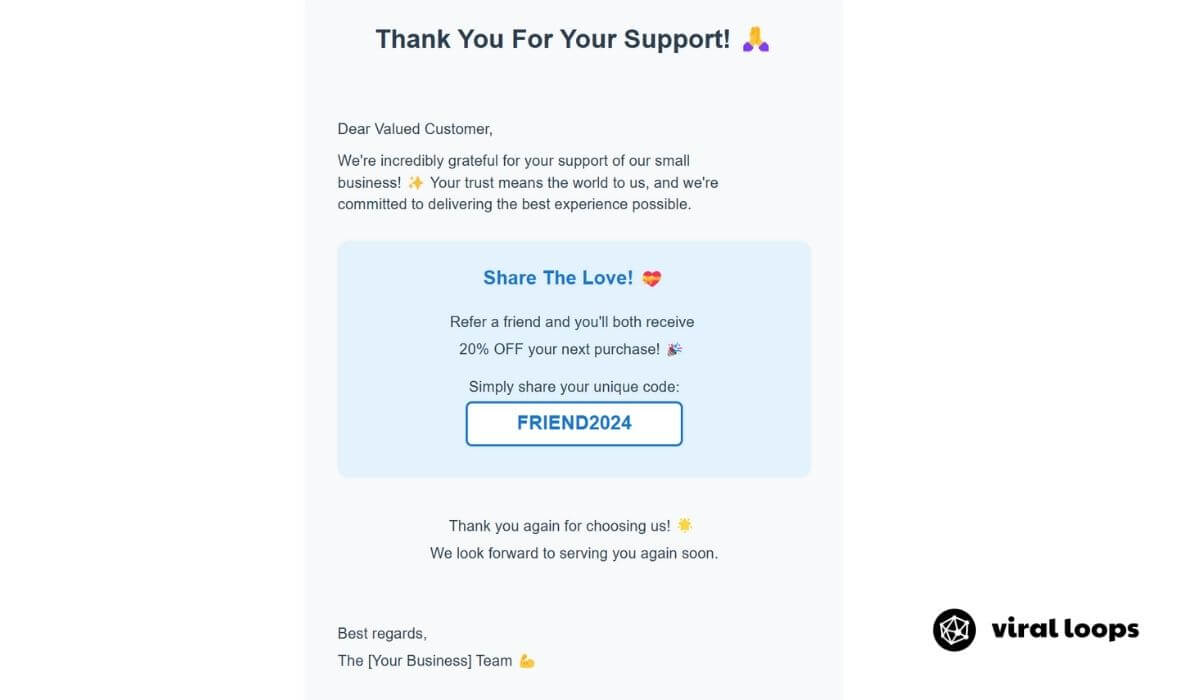
Gamify your Referral Programs
Turn your referral program into a game by creating a point system. Customers earn points for each successful referral, which they can accumulate to redeem bigger rewards. You can even introduce levels or badges to motivate and engage participants further.
Create Social Media Challenges
Social media platforms like Instagram and Facebook are perfect for sharing engaging posts or stories encouraging customers to refer a friend.
They offer the perfect space for posting eye-catching content and convincing your customers to share your business with friends. Use creative stories, engaging posts, or short videos to grab attention and inspire action.
Launch a social media challenge encouraging customers to share their experiences with your product or service. Set a theme for the challenge and offer special prizes for the most creative posts. Use a dedicated hashtag to track participation and increase visibility.
Promote the Customer Referral Program In-Store or On Location
Tell your customers that they can participate in a referral program when they visit your store.
- In-Store Placement: Place referral cards at checkout counters, reception desks, or waiting areas where they are easily accessible to customers.
- Direct Handout: Have staff hand out cards during face-to-face interactions with customers. This personal touch can enhance the perceived value of the referral program.
- Include in Packaging: Add a referral card to every purchase, whether in-store or via delivery, ensuring it reaches customers with their products.
- Event Distribution: Distribute cards during events, workshops, or sales to encourage participation among attendees.
You can provide your customers with a unique referral code, or you can ask them to tell referrals to mention who referred them in order to get a discount on their purchase. You or your staff should be able to log these referrals manually, especially if the purchase is done in-store.

Partner with Other Local Businesses
Collaborate with local businesses to create a mutually beneficial referral system. For example, partner with a nearby café or store to offer joint promotions or discounts to each other’s customers when they refer new clients.
6. Monitor and Adjust Your Program
Regularly review your customer referral program’s performance. Look at metrics such as referral rates, conversion rates, and customer feedback.
Be prepared to make adjustments to improve effectiveness. This could involve tweaking incentives, refining the process, or evolving your promotional strategy.
Continuous monitoring and adaptation help maintain the program’s relevance and success. As this requires a more in-depth understanding, let’s discuss it further in the next chapter.
How to Measure the Success of Your Referral Program
Understanding how well your referral program performs is crucial for its success. Think of it like keeping score in a game to see how you’re doing and where you can improve.
Before you launch your referral program, first, you need to know what exactly to track.
Key Metrics to Track
- Number of Referrals
Monitor the number of referrals coming in. This shows how engaged your participants are and how effective your program is at encouraging them to spread the word.
- Referral Rate
The referral rate is a key metric for small businesses to gauge the effectiveness of their customer referral programs. It measures the percentage of satisfied customers who refer new customers to the business. By tracking this number, businesses can see how well their referral strategies work.
A higher referral rate indicates successful word-of-mouth marketing, helping businesses grow their customer base without spending too much on traditional advertising.
- Conversion Rate
Look at the percentage of referrals that become actual paying customers. A high conversion rate indicates that your program attracts quality leads genuinely interested in your product or service.
- Customer Acquisition Costs (CAC):
Calculate how much it costs to acquire a new customer through your referral program. Lower costs mean you’re getting more value from your marketing budget.
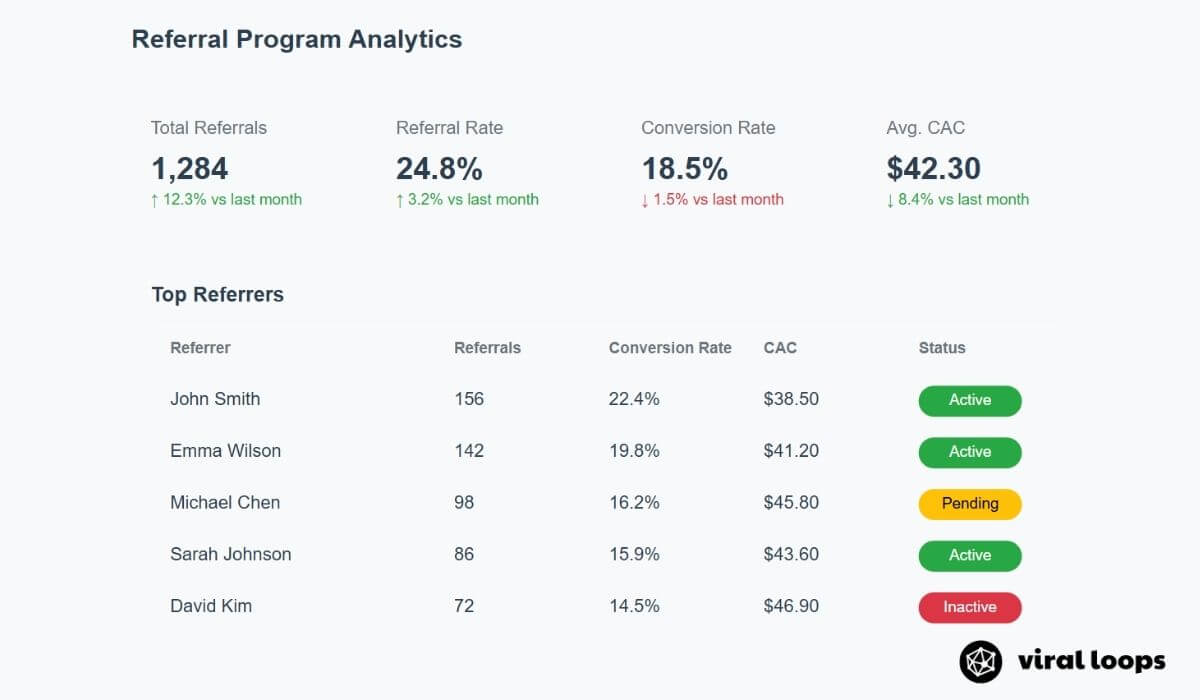
Analyze Performance
You know the metrics and understand what they stand for, what do you do next? Here’s what:
- Review these metrics regularly to understand your program’s effectiveness clearly. This will help you understand what’s working well and what needs tweaking. What are the results? How can you compare this month’s performance to the previous month’s performance? How do you compare against businesses in the same industry?
- Identify patterns or trends in the data. For example, if you notice a spike in referrals during a particular campaign, determine what made it successful and consider replicating that strategy.
- Use tools and software to automate data collection and analysis. This will save time and ensure that you have accurate information to make informed decisions. If you’re already using referral marketing software, then this is already done for you.
Make Improvements
- Adjust Incentives: Test different rewards to see which ones motivate people the most. Some audiences might respond better to discounts, while others prefer exclusive products or services.
- Experiment with Referral Methods: Try various ways for participants to refer others. This could be through social media, email, or direct sharing links. Find out which method your audience prefers or which generates more referrals.
- Refine Communication Strategies: Tailor your messages to different segments of your audience. Personalization can increase engagement and encourage more referrals.
Optimization Tips
- Stay flexible and open to change. The digital landscape evolves quickly, and what works today might be less effective tomorrow.
- Gather feedback from participants. Ask them what they like or dislike about the program, and use their insights to improve it.
- Keep the customer referral program fresh and exciting by introducing new incentives, features, or challenges to maintain participant interest and enthusiasm.
- Monitor competitor referral programs to see what they’re doing well. This can provide ideas for new strategies or highlight areas where your referral program can differentiate itself.
Best Practices to Maximize Small Business Referral Program
Growing your customer base becomes much easier when you focus on maximizing referrals. Think of it as getting your friends to spread the word about something cool.
Let’s explore some simple steps to make sure you cover all the bases.
Personalized Referral Links
Provide customers with personalized referral links they can share with their network. Personalization adds a touch of uniqueness and makes the referrer feel special, increasing the likelihood of them sharing the link.
Simplify the Referral Process
Provide easy-to-use referral codes. To encourage more participation, keep the referral process as smooth and straightforward as possible. Offer easily accessible referral links or codes that your customers can share without hassle.
The referral process should be straightforward with clear instructions—we highly recommend using simple forms or dedicated referral program software to facilitate the process.
These referral marketing software help guide your customers step-by-step, ensuring they know exactly what to do. This makes the process user-friendly and increases the likelihood of your customers spreading the word about your business.
Create Referral Program Variations
Testing which works best is a top marketer strategy. If the classic option doesn’t work, other strategies might just be the key:
- Referral Tiers: Develop tiered incentives where the more referrals a customer makes, the better the rewards they receive. This strategy encourages sustained participation and can lead to a compounding effect of new customer acquisition.
- Referral Contests: Organize referral contests where customers compete to bring in the most new business within a specific timeframe. Offer a grand prize for the top referrer, such as a high-value product or a gift card to a popular local venue.
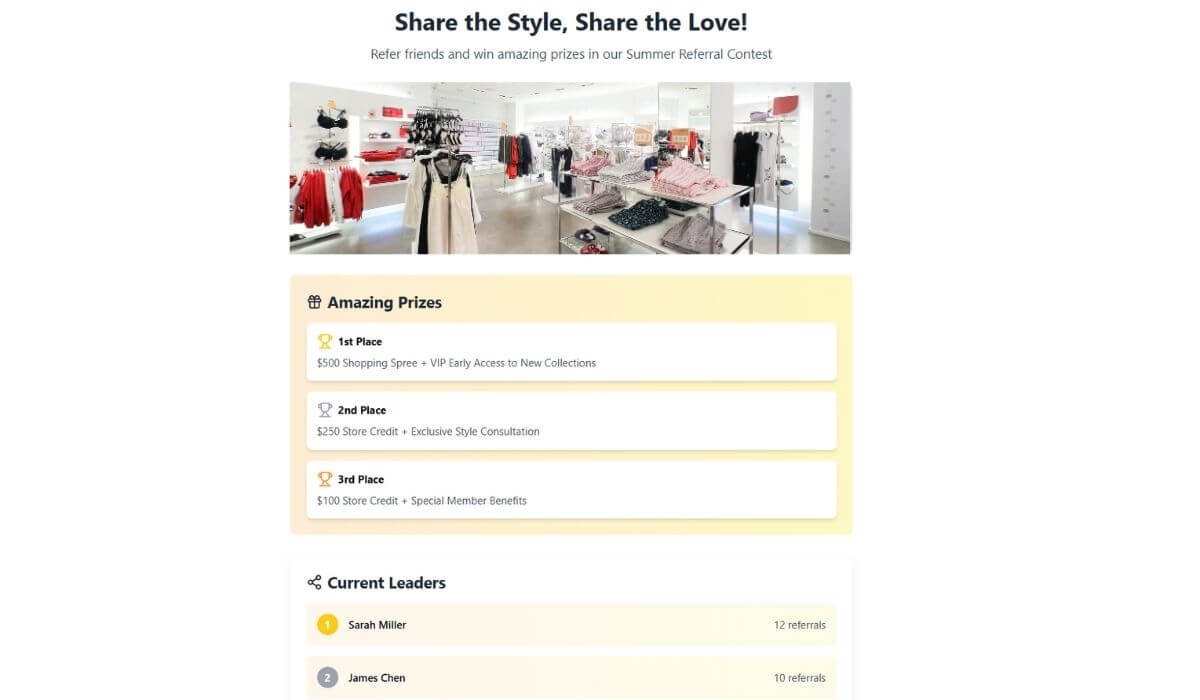
Nurture Relationships
A well-optimized, successful referral program should attract and retain new customers. To maximize lifetime value, focus on building a strong relationship with each new customer.
- Follow Up: Make sure to keep in touch with referrers and new customers through personalized follow-ups. A simple message or call shows them you value their support and keeps the relationship strong.
This personal touch makes them feel special and appreciated, encouraging them to stay engaged and continue supporting your business.
- Show appreciation with exclusive offers or thank-you notes, which helps build loyalty and long-term relationships. These small gestures can strengthen loyalty and lay the foundation for long-term relationships.
When you show appreciation, customers feel valued and are more likely to continue supporting your business, creating a positive cycle of mutual respect and engagement.
- Celebrate milestones and successes with your participants. When you recognize their contributions, you can boost morale and encourage continued participation.
Feature Customer Testimonials
Encourage customers who refer others to submit testimonials. Feature these stories on your website or social media, giving referrers added recognition and encouraging others to participate in your customer referral program.
This is called social proofing, and it’s one of the proven ways to encourage customers to take the leap with referring family and friends to a business.
Seasonal or Themed Promotions
Align referral promotions with holidays, seasons, or special events. For example, offer double rewards during a holiday season, or a special summer-themed prize for successful referrals made during the summer months.
Loyalty Program Integration
Integrate the customer referral program with an existing loyalty program, allowing customers to earn additional loyalty points for each succesful referral. This creates a seamless experience for customers already invested in your brand.
Success Stories and Case Studies
Referral programs provide an excellent way for small businesses to grow their customer base without spending a ton on traditional advertising. Viral Loops offers tools to set up such programs, and several businesses have seen impressive results.
Let’s dive into how three small businesses successfully leveraged Viral Loops for their referral programs.
Boba Nutrition
Boba Nutrition offers a unique ambassador program that encourages people to promote healthy bubble tea alternatives.
As an ambassador, you sign up to receive a special referral link. You then share this link with friends, family, or anyone interested. You earn rewards when someone uses your link to join as an ambassador. These rewards include discounts, gift cards, exclusive access, and cash prizes. The more people you refer, the more rewards you can unlock. However, you can only earn each reward once.
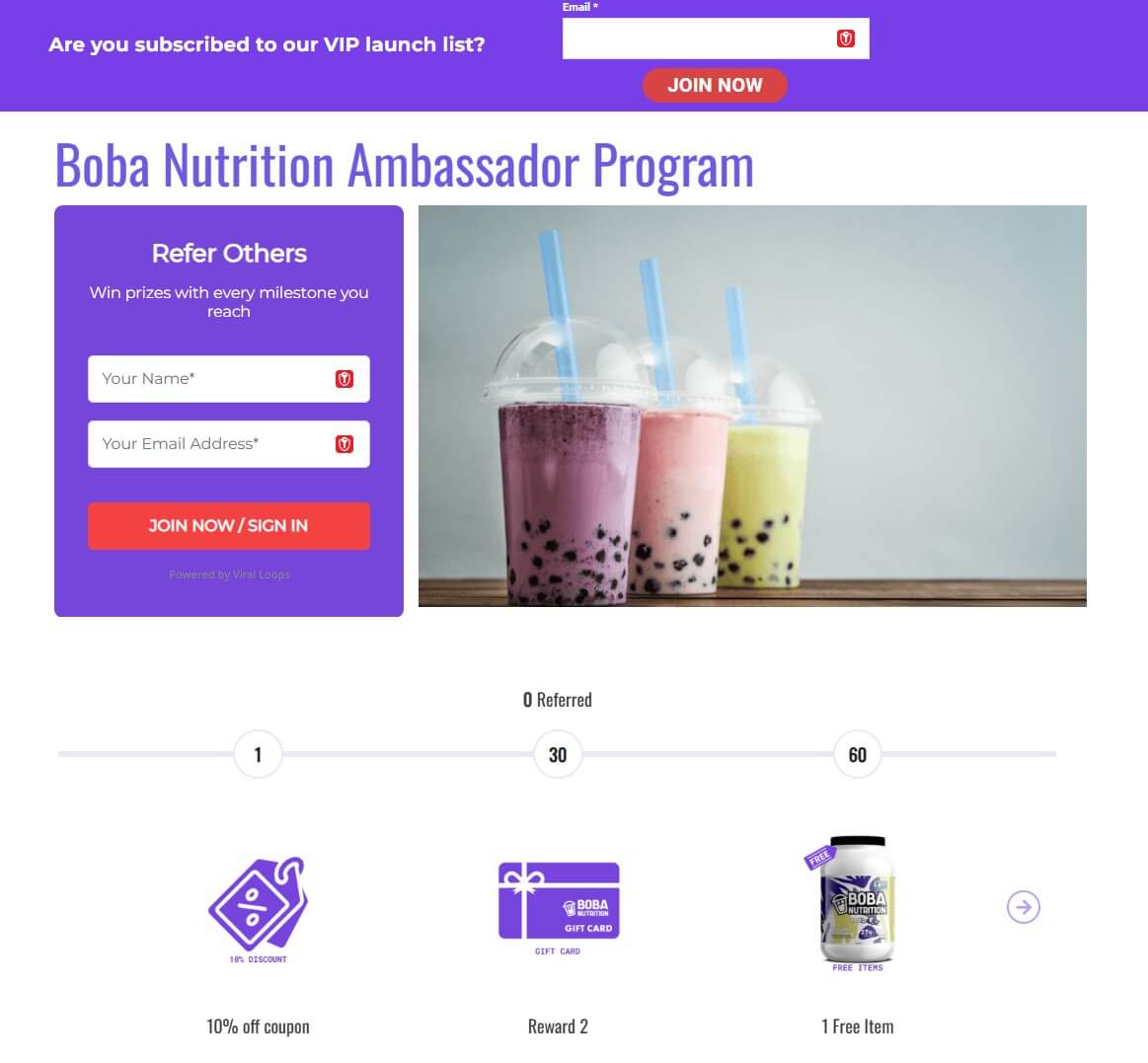
The program ensures fairness by verifying referrals to prevent fraud. Ambassadors also represent Boba Nutrition’s mission of providing healthier drink options. This program helps spread the word about Boba Nutrition and rewards ambassadors for their efforts, making it a win-win for everyone involved.
Hippie Water
Hippie Water offers a unique line of hemp-derived THC-infused beverages designed to provide a feel-good experience without the hangover.
These drinks combine real fruit juices with a hemp emulsion to create a mellow, euphoric vibe. The company aims to offer a social and relaxing alternative to traditional alcoholic beverages, allowing people to enjoy themselves without the negative aftereffects.
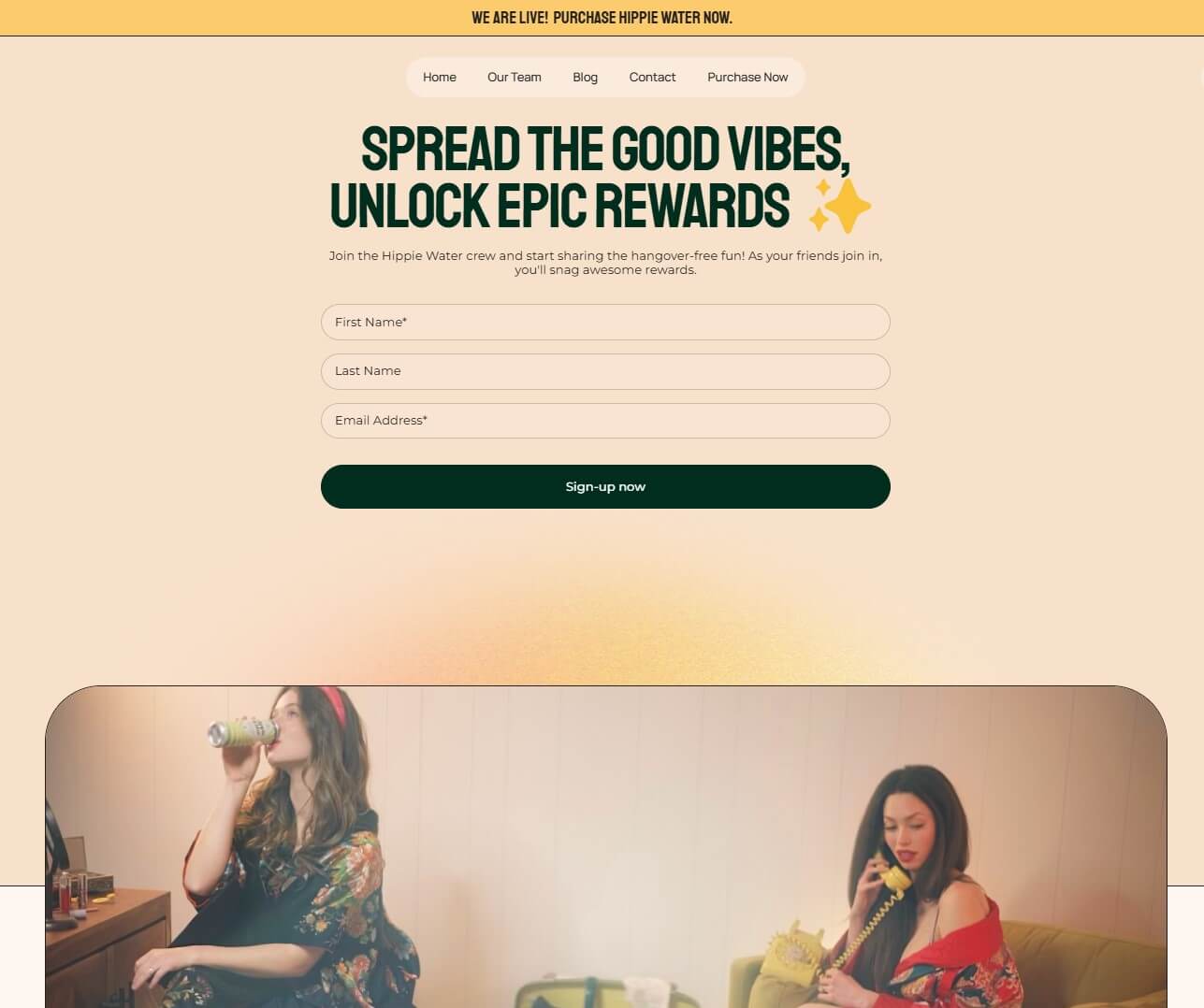
Their “Share the Love” referral program encourages customers to spread the word about Hippie Water. You unlock various rewards when you share your experience and friends join in. This program helps expand their community and rewards loyal customers for their support.
The more friends you refer, the more rewards you can earn, making it a fun and engaging way to enjoy Hippie Water while sharing the good vibes with others.
JoeyWears
JoeyWears, an innovative e-commerce company, aims to revolutionize underwear with superior comfort and sustainability. They developed boxers with unique pouch technology to prevent sweat, using fabric three times softer than cotton. Their Kickstarter campaign sought to raise $15,000 but quickly surpassed this, reaching over $100,000 with over 1,000 backers.
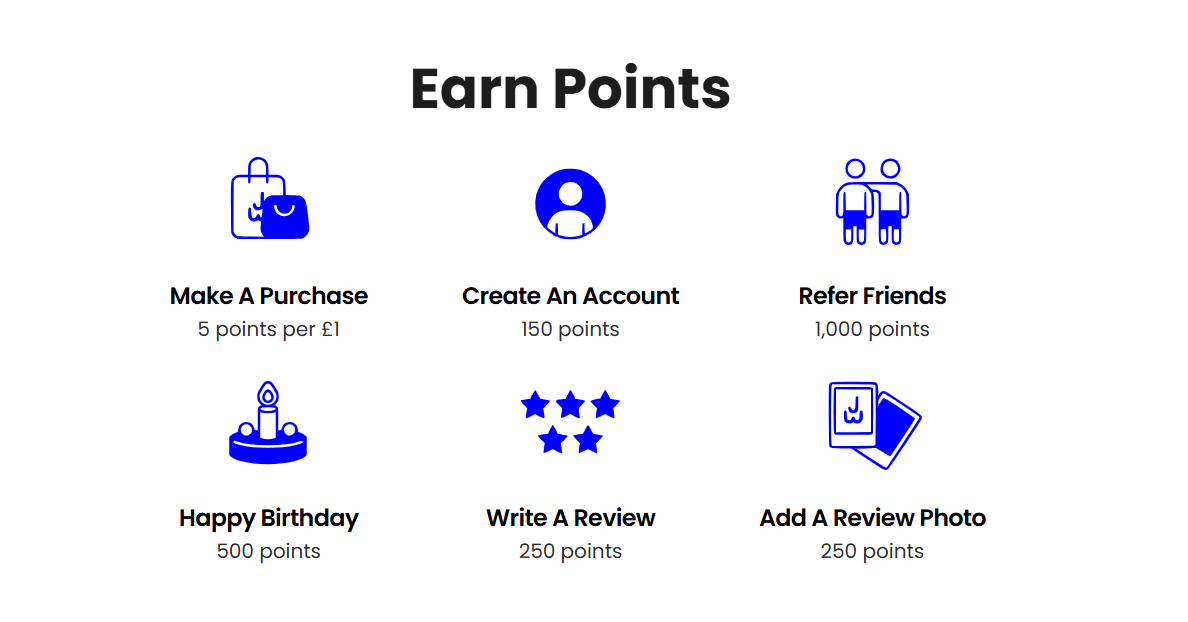
JoeyWears’ referral marketing approach helped them achieve a strong start on Kickstarter, which is crucial for gaining momentum. Their referral program effectively converted email sign-ups into backers, demonstrating the power of word-of-mouth marketing.
JoeyWears’ success highlights how strategic referral programs can significantly impact crowdfunding efforts, helping them reach their goals and expand their community.
Read more about JoeyWears’ referral strategy.
Wrapping It All Up
If you’re a small business owner with big dreams, now’s the time to revamp your referral game using the strategies we’ve dished out here.
Remember, every referral is like a golden ticket straight to the heart of new customers, edging you ever closer to success.
Book a free demo of Viral Loops and find out how we can be your trusty sidekick in your quest to craft and manage killer referral programs for your small business.
